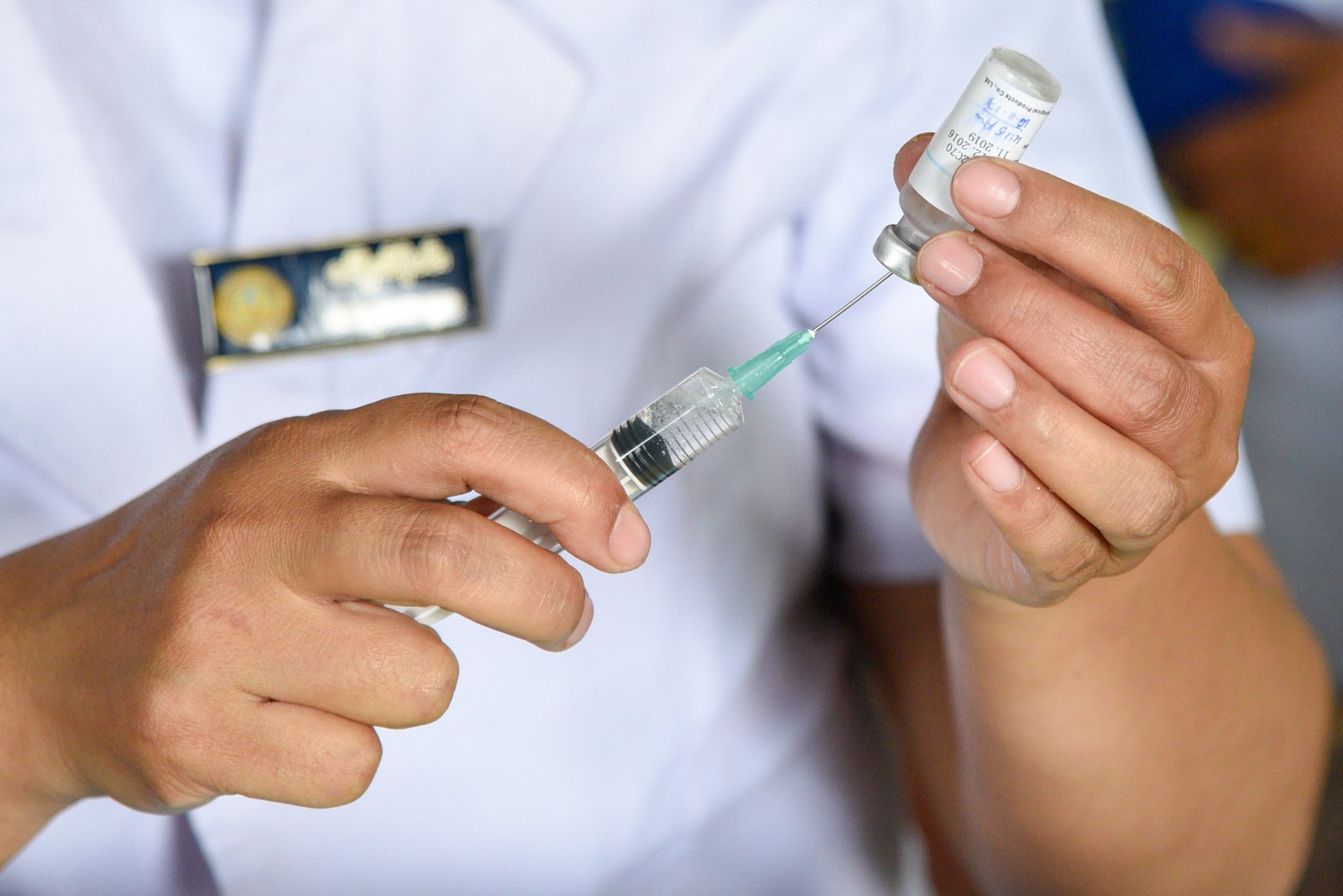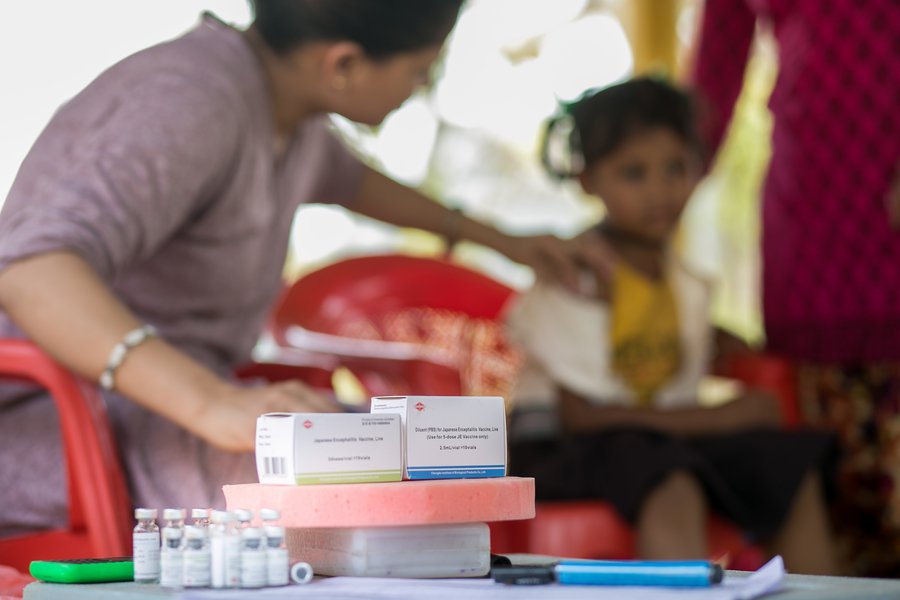According to the World Health Organization (WHO), a record 123 million infants received lifesaving vaccinations in 2017, and vaccines save an estimated 3 million lives every year. This has led to increased life spans across the globe, particularly in low-resource countries. At PATH, we are committed to making those numbers rise. It is why we work on vaccines.
Yet, despite the lightning pace of advancements in immunization activities, a number of challenges threaten to stall or reverse the major inroads created by the global public health community and countries. For example, climate change will alter the way diseases interact with our environment and affect how vaccines protect at-risk populations. Violent conflict, globalization, growth in urbanization and external migration, and the emergence of antimicrobial drug-resistance could all make children more susceptible to vaccine-preventable diseases. But at PATH, we don’t shy away from persistent or emerging challenges — we address them head on with new technologies, better data, improved policies, and efficient and appropriate immunization systems.
We work on vaccines because they save lives
Forecasts for vaccine use in low-income countries project that vaccines administered between 2011 and 2020 will avert 17.7 million deaths in children under age age five. This is why, for more than 20 years, PATH has worked to ensure that countries have the appropriate tools to maximize this benefit.
We help vaccines achieve their lifesaving potential by looking at entire vaccine systems, from development to delivery. In Africa, we helped streamline logistics, improve cold chains, and build awareness about the MenAfriVac ® vaccine, which protects against group A meningococcal meningitis. We also worked with WHO and Serum Institute of India Pvt. Ltd. to ensure that the vaccine was effective, affordable, and sustainable. By 2020, the MenAfriVac ® vaccine is expected to protect more than 400 million people and prevent 1 million cases of meningitis A.

PATH is at the forefront of the constantly evolving vaccine field — navigating challenges, addressing inequity, and innovating for the future. We do this so that children, no matter where they are born, can survive and thrive. PATH/Thet Htoo
We also work to ensure decision-makers have appropriate and accurate data to introduce new vaccines, which is largely lacking in many settings. For more than two decades, PATH has been at the forefront of efforts to build the evidence base for cervical cancer interventions and to protect young women in low- and middle-income countries (LMICs) against human papillomavirus (HPV). To increase access to the cancer-preventing HPV vaccine, PATH assists countries on the planning, implementation, and evaluation of HPV vaccines; conducts demonstration programs; and supports national vaccine introductions. Since the HPV vaccine became available in 2006, more than 100 countries have introduced it into their national immunization programs. It appears that elimination of cervical cancer, which developed in 570,000 women last year, is possible.
We work on vaccines because we care about health equity
Vaccine-preventable diseases are exponentially more destructive in low- and middle-income countries and among vulnerable populations. Of the 7.5 billion people in the world, more than 1.6 billion live without access to basic health care. Vaccines are one of the most cost-effective ways to ensure those populations live more healthy and productive lives.
However, many countries can’t afford expensive vaccines, and manufacturers often have little incentive to enter volatile or nonexistent markets. This is why PATH partners across sectors and borders to reduce barriers to entry and incentivize vaccine producers. Over the last 16 years, PATH collaborated with governments, manufacturers, and global policymakers to identify and deliver an affordable vaccine to protect against the untreatable Japanese encephalitis (JE) virus. JE kills or permanently disables two-thirds of the people infected with the mosquito-borne virus. Today, this vaccine protects more than 300 million children in LMICs against JE, proving that neglected tropical diseases are preventable at a large scale.
In addition to challenging market dynamics, many low-resource countries are home to rapidly aging health infrastructure, limited technology, and low disease awareness. PATH works with local and national governments to ensure health care workers, facilities, cold chains, and logistics systems are in place to immunize children in the hardest-to-reach corners of Earth. We help improve immunization services with better data collection, quality, and use. We designed vaccine vial monitors — used on more than 7 billion vials — that let health workers know whether the vaccine can be safely used for immunization. We raise awareness about diarrheal diseases, the second leading killer disease of children under five. These tools, vaccines, and strategies protect the people most vulnerable to disease.
We work on vaccines to protect our future
While the vaccine community has much to celebrate, new challenges continuously arise that require innovation, tenacity, and adaptability. But we don’t see a gloomy future. Why? Because we know vaccines are one of our greatest tools to mitigate these challenges and help the most vulnerable populations adapt to a constantly changing world. PATH applies a multifaceted approach to ensure appropriate solutions make it into the hands of those populations. We know that if we want vaccines to work for us, we need to work for vaccines.

From procurement, advocacy, and healthcare worker training to injection and evaluation, PATH helps countries like Nepal introduce new vaccines. PATH/Rocky Prajapati
For example, PATH is working to prevent pneumonia, the world’s leading cause of child death — and we’re doing it with new vaccines and new platforms. We’re advancing maternal immunization, which provides protection at birth and for several months thereafter and could strengthen maternal and infant healthcare systems. And just as the reduction in malaria cases in Africa plateaus, PATH is helping roll out pilot introductions of the RTS,S vaccine which will be made available to 750,000 young children living in Ghana, Kenya, and Malawi – a major advancement in a global effort to eradicate malaria that began nearly 40 years ago. And, because malaria is so adaptable, we’re working on other novel and innovative ways to prevent its transmission.
We work on vaccines because they are the cornerstone for global health security and epidemic preparedness, resilient health systems, and universal health care. We work on vaccines because they are one of the most successful, cost-effective solutions to ensure that children, no matter where they are born, can survive and thrive. We work on vaccines because we envision a brighter future for everyone.



